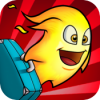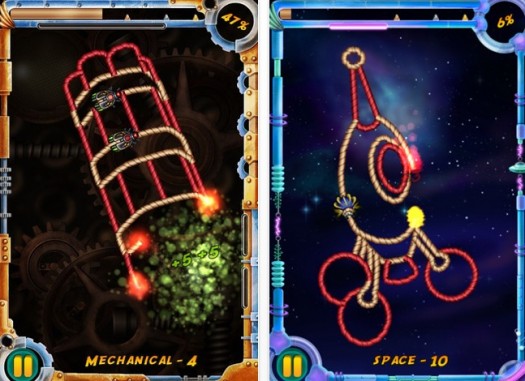 Big Blue Bubble’s Burn The Rope Worlds [$.99] is an intensely faithful follow-up that feels like a yearly iteration of a well-trod franchise. It’s as great as its predecessor is, but only in the strictest sense. It’s as if the core of Burn The Rope [$.99 / Lite / HD]was transplanted, not massaged and implemented, into this sequel, which makes the staggering amount content the only meaningful mark of differentiation between the two games. A better name for this would have been Burn The Rope: More Burn The Rope — a great proposition, but a flat approach to sequel design.
Big Blue Bubble’s Burn The Rope Worlds [$.99] is an intensely faithful follow-up that feels like a yearly iteration of a well-trod franchise. It’s as great as its predecessor is, but only in the strictest sense. It’s as if the core of Burn The Rope [$.99 / Lite / HD]was transplanted, not massaged and implemented, into this sequel, which makes the staggering amount content the only meaningful mark of differentiation between the two games. A better name for this would have been Burn The Rope: More Burn The Rope — a great proposition, but a flat approach to sequel design.
If you’re new to Burn The Rope, the short of it is that it’s a rotation-based puzzle game where you control multiple points of interest (fire) on a line of virtual rope by tilting your phone. If you tilt it the wrong way, the flame goes out. You’re awarded with medals and progression if you manage to burn significant chunks of rope, which can be a harder task than you’d think since additional flame can spurt whenever it hits fulcrum points. Colored rope and bugs are later introduced as complimentary parts that add to the strategy. By setting fire to a bug, you get a special color of flame that can only effect that color of rope.
The disconnect between the characterization of the flame and the actual fire mechanic is an issue in Worlds just like it is in the original, but Worlds is a much more coherently themed package. As its namesake implies, there are several worlds to visit and all four of them have an effective thematic hook. The coloring of the puzzles and the art design in general are the real stars of the approach, as they subtly give each world a vibe that the others don’t have. Each world is also represented by an avatar overlord, but just like with fire character, Big Blue fails to connect these things in a meaningful way.
If you tire of one world, you can switch to another freely, which is a great touch that can stall the monotony of long sessions. The increased focus on bugs and colored rope helps too, as well as the intricately produced — and sometimes wildly angular — puzzles. In the first title, these three constituent parts fleshed out a fire mechanic that could quickly get dull. In this one, the focus tends to give levels more of a puzzle-y vibe and add to the strategy, as well as compliment an overall pace that feels ramped up.
One of the key improvements outside of Worlds sharper presentation is the cornering of the flame: tough angles are easier to manage from a rotation and a difficulty perspective. This alone makes for a slightly better experience on an already tight and refined foundation that, really, had no other significant flaw. It’s just more fluid now.
If you’re going to take home one thing about Worlds, it should be that — sure, it’s more of the same, but the “same” part is consistently fun, well-produced, and well-designed. Worlds straight up has the potential to provide hours of entertainment. The 100 puzzles that Big Blue has added is like an extra and prettier layer of icing on a fab cake.
There are a few misfires. The penetration of ads across the “Puzzle of the Day” and the full-screen ads before regular campaign missions are disruptive. On a more insignificant note, the new Snake-like game mode “Endless Burn” feels like an out-of-place and tacked-on feature. It doesn’t feel like a part of the game, it doesn’t play like the game, and it plain just isn’t that much fun to fiddle with.
Worlds fulfills at least one promise of any sequel: it’s more of the same great game. And while we’d love to have seen more progression, this is still a fantastic product that should keep you busy in bursts or even in couch sessions. I recommend it.

